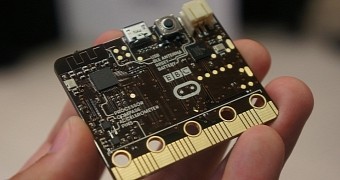You can't have Britain, Education and Technology put together without mentioning names like BBC, ARM, Barclays, Freescale and many other UK companies working together to bring the wonders of programming and PC technology to the new generation of British kids.
Following in the steps of the successful 1980s BBC Micro that introduced IT technology for the first time to the kids across the UK, BBC repeats this feat and unveils the micro:bit.
The micro:bit is essentially a pocket-sized, codeable computer that allows children to get creative with technology. BBC plans to give up to 1 million free devices to every 11- or 12-year-old children across the UK.
The BBC micro:bit is essentially a pocket-sized computer that you can code, customize and control to bring your digital ideas to life. It's 4cm/5cm in size and will be available in different colors, being simple and fun to use. Kids will be able to code LED lighting up and different pattern with no prior knowledge of computing.
The BBC micro:bit will include 25 programmable red LEDs, two programmable buttons that can act as a game controller, on-board motion detector, a built-in compass, Bluetooth, and five input and output (I/O) rings.
BBC wants to grow a more IT-conscious and tech-savvy generation
Each element of the BBC micro:bit will be completely programmable via a downloadable software that'll arrive this summer on micro:bit's official website. The software can be accessed from a PC, tablet and mobile, and it will be a personal area where you'll be able to test your creations in a simulator before they are transferred to your micro:bit.
BBC plans to work with schools and teachers over the summer to ensure that resources, information and support will be available to them until micro:bit hits distribution this autumn when its release is planned.
BBC hopes the micro:bit will make a significant impact in 2015 providing up to 1 million micro:bits before the end of the year. Also, BBC hopes that it will find partners that will keep the micro:bit legacy alive through open source in a non-profit manner.

 14 DAY TRIAL //
14 DAY TRIAL //